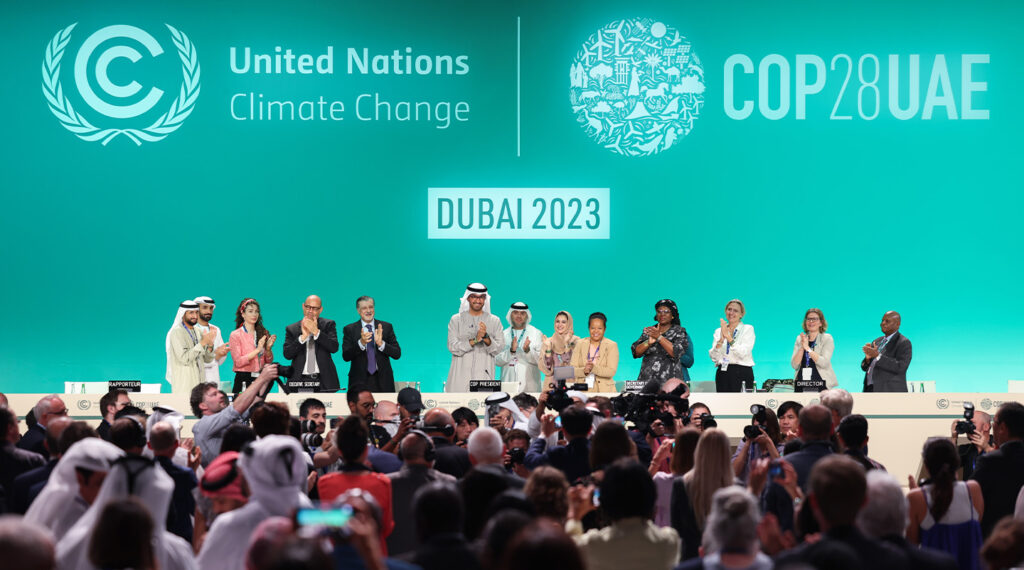Philanthropy and COP: Pathways for meaningful engagement
Section

What is a COP?
The United Nations Framework Convention on Climate Change (UNFCCC) holds annual meetings, known as the Conference of the Parties (COP). 197 nations, as well as the EU (i.e. “the Parties”), review the implementation of climate actions and assess progress toward the goal of stabilising greenhouse gas concentrations “at a level that would prevent dangerous anthropogenic (human-induced) interference with the climate system.”
COPs are underpinned by the Paris Agreement and, while primarily serving as diplomatic negotiations, they are also valued as a global moment that brings together the broader climate community to exchange opinions on how to effectively drive climate solutions and forge partnerships.
As the climate crisis accelerates, COPs have become crucial arenas for advancing coordinated climate action at global level. Through strategic engagement inside and around the COPs, philanthropy can shape and support more ambitious, equitable and holistic climate action.
Foundations will naturally tailor their approaches to COP engagement based on their size, influence, level of ambition, and strategic priorities, recognising that there are diverse pathways to contribute—whether through shaping the institutions themselves, supporting meaningful participation of grantees, funding research, or fostering partnerships and spaces for collaboration.
This flexibility allows for a range of engagement options that align with the unique strengths and goals of each foundation, ensuring that, even with different capacities, philanthropy can play a role in advancing climate action in the governance spaces.
This document summarises key insights from two webinars organised ahead of and after COP28 by Philea’s European Philanthropy Coalition for Climate, with an eye towards COP29 in Baku and beyond.
Seven ways philanthropy can engage around COP processes
1. Championing diverse voices and perspectives
Philanthropy has taken steps to ensure that historically marginalised groups which are often also disproportionately impacted, such as young people from the Global South and Indigenous communities, can meaningfully participate in COP processes.
Philanthropy can provide essential direct support, covering expenses like travel, visas and accommodation, supporting accreditation, offering media training and capacity building as well as opportunities to connect with other relevant stakeholders. This increases the visibility and effectiveness of their work and enhances their capacity for strategic engagement. In recent years, there have been growing concerns around restricted civic spaces and the safety of attendees, highlighting the need for thoughtful support from philanthropy.
2. Shaping equitable and effective global institutions
Philanthropy has been involved in shaping global climate frameworks, including the UNFCCC itself and the landmark Paris Agreement during COP21. For example, from the outset, philanthropy has supported the participation of least developed and developing countries which is essential for creating equitable and effective decisions.
The principle of “one nation, one vote,” ensures that all Parties, regardless of size or geopolitical and economic influence, have the same voting power and promotes fairer outcomes as it allows smaller, more vulnerable countries to push for stronger commitments. This is particularly important in a context where decreases in overseas development aid are further limiting the capacity of certain countries.
3. Connecting COPs to reality
The question at the core of the climate debate is not whether we need to take urgent climate action or not. Instead, the question is: what kind of action do we want to take? It is crucial for philanthropic efforts to support this transition in a way that resonates with and acknowledges the actual experiences of individuals across different communities. Philanthropies can create spaces to convene different actors, including government officials, representatives from civil society and the private sector, and can support multi-stakeholder coalitions and partnerships.
4. Supporting research for evidence-based action
Supporting climate-related research provides policymakers with the data and insights needed to craft ambitious, evidence-based climate policies. This must be paired with effective communication strategies to ensure that the messages coming out of the COPs resonate effectively with global audiences, generating momentum for impactful outcomes and action.
5. Fostering a cross-cutting approach to climate action
Historically, the COP agenda has focused heavily on climate mitigation. However, in recent years, philanthropy has worked hand-in-hand with other stakeholders to ensure a more holistic, multi-dimensional approach to climate action that includes adaptation, loss and damage as well as cross-cutting issues such health, food and agriculture and migration.
At COP28, philanthropy tangibly contributed to all these areas, from working with the COP presidency around the first-ever Health Day, to supporting pavilions and other spaces for discussions, to announcing additional funding commitments towards regenerative agriculture, the nexus of health and climate and adaptation, among others.
6. Ensuring transparency and accountability
The Paris Agreement operates on a system of peer accountability, rather than traditional enforcement mechanisms. This involves nations voluntarily setting their own emission reduction targets and reporting on their progress.
The success of this approach relies on transparency, international cooperation, and the pressure of global public opinion. Philanthropic support is vital for accountability mechanisms that guarantee that parties live up to their commitments and continue to increase their ambition.
These mechanisms include independent scientific assessments of national policies and progress (such as the Climate Action Tracker which assesses nationally determined contributions), social movements and advocacy that create pressure on decision-makers as well as strategic litigation. Philanthropy can also support the co-creation and implementation of nationally determined contributions at local level, which must be resubmitted in 2025.
7. Building momentum through other international gatherings
While the COPs only happen once a year, they are not one-off events. Instead, we need to increasingly see COPs as milestone moments, supported and informed by, and able to influence, other international governance moments.
Beyond COPs, philanthropy can also leverage other international climate gatherings to build momentum. Global forums like the United Nations General Assembly, the G20, and other regional and thematic meetings provide key moments for funders to align their efforts with global climate action. By engaging strategically around these gatherings, philanthropic organisations can take a more sustained approach and ensure greater continuity in climate negotiations, bridging the gaps between regional priorities and the global climate agenda.
These pathways highlight the multiple engagement opportunities for all foundations to engage around COP processes and are not limited to traditional climate funders. The root causes and impact of the climate crisis involve all areas of philanthropic activity and global decision-making must resonate with and incorporate the lived realities of communities, particularly those most impacted.
Philanthropy can play an important role as a convener, bridge-builder, enabler, orchestrator and champion of just climate action. This is a two-way process as the momentum generated by COPs also acts as a catalyst for philanthropic conversations and action, inspiring philanthropic organisations to initiate or expand their climate work and align it with global climate priorities, ambitions which initiatives like Philanthropy For Climate aim to foster and uplift.
Eager to learn more about the policy priorities of COP29 and their implications for the philanthropic sector? Join us on 17 October for “Philanthropy and COP29: Opportunities for Engagement and Impact.”
Image credit: COP28 / Christopher Pike
Contact

